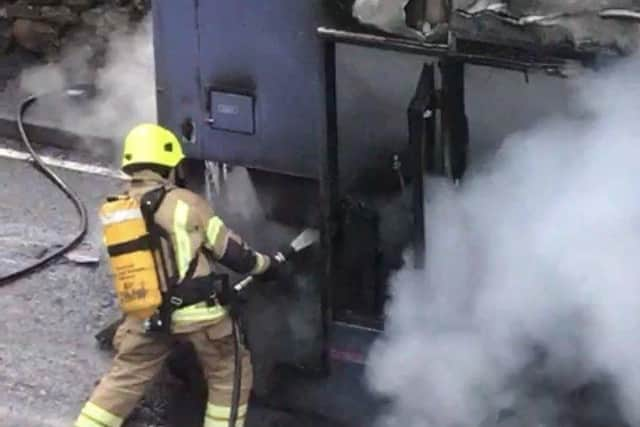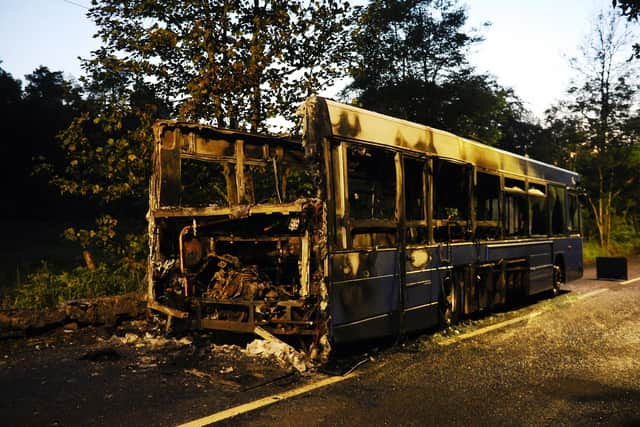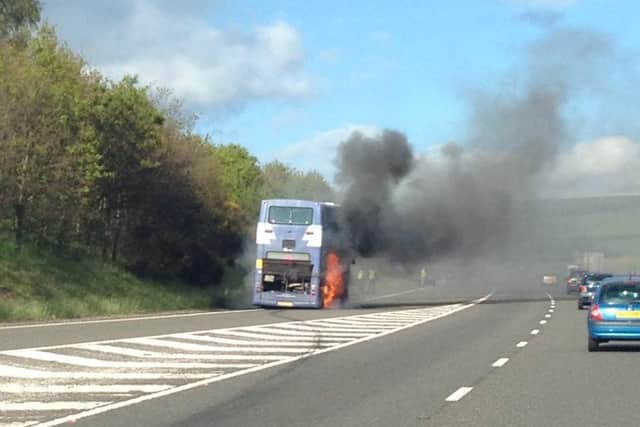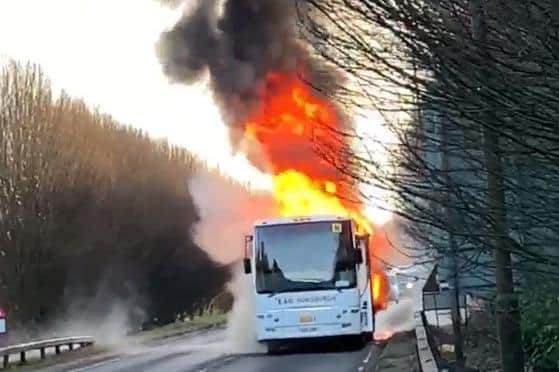Bus and coach fires increase in Scotland 'must be thoroughly investigated'
There have been more than 200 incidents north of the Border since 2015, the Scottish Fire and Rescue Service statistics reveal.
They included a coach catching fire while transporting school children in Livingston in 2019, as this footage shot by one of the pupils shows.
Advertisement
Hide AdAdvertisement
Hide AdThe revelation came as an industry source said it was likely that not all fires were reported to the UK Government’s vehicle safety agency.


The Rail, Maritime and Transport (RMT) union called for action to tackle the causes of the fires.
Figures obtained from a freedom of information request showed the total number of fires tackled by firefighters increased from 31 in 2015-16 to 32 the following year and it went up again to 43 in 2017-18.
It rose for a third year to 48 in 2018-19.
Last year, the total fell by one, and it has reached 12 so far in 2020-21, although bus and coach mileage is likely to have been substantially cut by the Covid pandemic.


In nearly one in five of the fires – 40 of the total 213 - the entire vehicle suffered fire or heat damage.
Since 2015, the highest number of incidents was in Glasgow (22), followed by Highland (19) and Aberdeenshire (14).
Other areas with the most fires were 13 in Edinburgh, 12 in North Lanarkshire and 11 in West Lothian.
By comparison, Aberdeen recorded six and Dundee five.


Electrical faults were the most common cause, followed by fuel line or pump problems, and wheel or brake faults.
Advertisement
Hide AdAdvertisement
Hide AdNaked flames, matches, cigarette lighters and fireworks were listed among other causes, along with wiring problems.
A total of nine people were slightly injured or required first aid in the incidents, including four after an engine fire caused by a wiring fault at Ellon in Aberdeenshire in February 2019.
However, the figures did not specify the operator or make of vehicle involved in each incident.


The RMT, which represents bus workers south of the Border, has already raised concern about fires in England.
General secretary Mick Cash told The Scotsman: "These figures show a concerning increase in the number of bus fires in Scotland recorded in recent years.
“We believe it is important this trend is thoroughly investigated and action taken to tackle the causes of bus fires.
"RMT has longstanding concerns about the risks to bus workers and passengers of vehicle fires.
"There should be a consistent, industry-wide approach to bus safety which ensures all operators are complying with their health and safety duties, there is a comprehensive evacuation procedure that is communicated to bus workers and passengers, operators ensure bus drivers can directly and easily contact emergency services in the event of an incident, all vehicles are regularly maintained and inspected, and the potential for fires is thoroughly risk assessed.”


Advertisement
Hide AdAdvertisement
Hide AdAn industry source told The Scotsman it was likely that operators were under reporting fires to the Driver and Vehicle Standards Agency (DVSA), despite being legally required to notify it of accidental incidents while vehicles were in service.
The source also said electrical wiring in newer vehicles was often difficult to access behind panels.
The UK Government agency said it would crack down on any firms not complying.
A spokesperson said: “DVSA is committed to protecting everyone from unsafe drivers and vehicles.
“We investigate every fire on a bus or coach reported to us and monitor the frequency of reports to spot issues with bus companies and manufacturers.
“Bus companies have a legal responsibility to report accidental fires to DVSA.
"We will not hesitate in taking action against companies that fail to report this critical information to keep Britain’s road among the safest in the world.”
The agency said its enforcement teams could make unannounced visits to operators and demand to see safety records and inspect vehicles.
Advertisement
Hide AdAdvertisement
Hide AdIt said it could prosecute operators for safety failings and refer them to the Traffic Commissioner for Scotland, who regulates bus and coach firms and could impose penalties such revoking operators’ licences.
The DVSA also has a dedicated team monitoring bus and coach defects, which could force manufacturers to recall vehicles.
It said safety issues could also be reported anonymously to DVSA on 0300 123 9000.
A spokesperson for Claire Gilmore, the Traffic Commissioner for Scotland, said: “Traffic commissioners are always concerned about any risk to road safety, including that posed by bus fires.
"They give careful consideration to all reports they receive from the DVSA, particularly those which demonstrate a failure on behalf of an operator to ensure vehicles are fit and serviceable.”
Joan Aitken, Ms Gilmore’s predecessor, who stepped down in 2019 after 15 years in the role, said: “I always took bus fires extremely seriously and had no hesitation in calling operators to account for worrying cases.”
The Confederation of Passenger Transport, which represents bus and coach operators, said traffic congestion cutting bus speeds and dirty roads were factors in increased fires.
Ralph Roberts, its Scotland chair and managing director of Greenock-based bus operator McGill’s, said: “As buses go ever slower, there is more heat build up in the engine bay due to less airflow to pull out the hot air.
Advertisement
Hide AdAdvertisement
Hide Ad"This means that components are working in higher ambient temperatures and should a fault occur, the likelihood of fire is greater.
"Road dirt gets thrown up by the bus tyres and pulled into the cooling packs by the fans, which blocks the airflow and causes the engine and other components to run hotter.”
Mr Roberts said the latest diesel engines also had to run hotter to improve combustion and reduce nitrogen oxides.
Perth-based Stagecoach, which operates across much of Scotland including the Highlands and Aberdeenshire, and is the UK’s biggest bus and coach firm, said it made a detailed examination of every fire and swiftly took any necessary action.
A spokesperson said: “The safety of our customers, employees and other road users is our absolute priority and close to all journeys get customers to their destination without incident.
“We take any incident of this nature extremely seriously and always carry out an in-depth investigation.
"This includes determining the root cause and immediately taking any corrective action needed."
Andrew Jarvis, managing director of First Scotland, the main bus operator in Glasgow, Aberdeen, Falkirk, Stirling and West Lothian, said: "The systems and technology that are fitted to buses today deliver high performance in relation to efficiency and cleaner greener travel.
Advertisement
Hide AdAdvertisement
Hide Ad"We have robust and comprehensive processes and procedures in place to maintain and look after our fleet of buses, and thankfully it is very rare we incur any serious incidents involving steam or fire-related faults.
"The number of fires started maliciously are also thankfully rare.
"Safety is our number one priority and focus for the well being of our staff and customers and will always be at the forefront of everything we do.”
Xplore Dundee, the city’s main operator, said it had “not faced any significant challenges with bus fires in recent years”.
Unite, the union which represents most bus workers in Scotland, said: “This issue hasn't come up for us”.
A message from the Editor:
Thank you for reading this article.
We're more reliant on your support than ever as the shift in consumer habits brought about by coronavirus impacts our advertisers.
If you haven't already, please consider supporting our trusted, fact-checked journalism by taking out a digital subscription.
Comments
Want to join the conversation? Please or to comment on this article.
